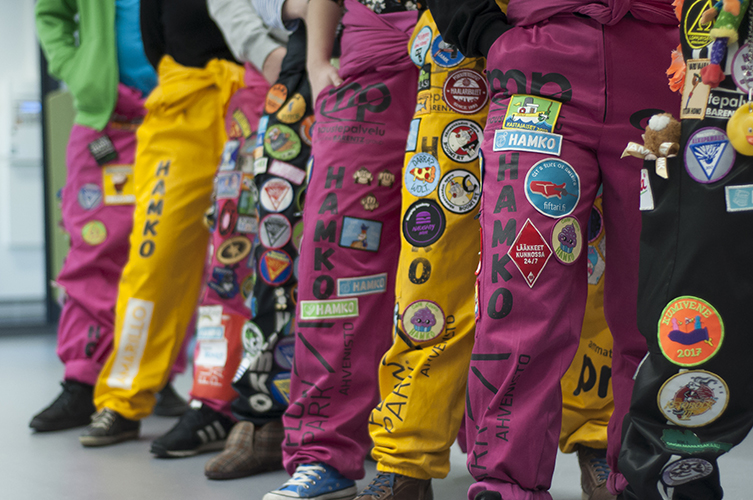When our bus swung into the cap park at the Häme University of Applied Sciences in Hämeenlinna on this year’s SUs study tour, a student emerged from a building wearing an overall covered in patches – looking like he’d just walked off the set of Ghostbusters 4.
Students wearing overalls is a practice that originated at Sweden’s Royal Institute of Technology in the late 1960s, where they were needed for company excursions – but rapidly transformed into a symbol of both individual student identity and subject-based belonging.
Students are easily recognised as part of a particular subject association and are worn on any type of student event, ranging from parties and “sitsit” (long-table social singing events) to hikes and sometimes even in daily life.

Probably the most important part of the tradition are the “haalarimerkki” – patches that are sewed to the overall. They are sometimes associated with participation in key student events (for example at city rallies), or given out by local businesses, institutions, graduate recruiters or associations like the SU or the local housing co-op. Students collect them avidly, and over time the overall becomes a kind of collection of memories of your time as a student.
It’s a fascinating combination of building belonging through subject-based identity and a way for students to express their individuality – all while playing to the instinct to collect things that are rare and remind us of key times as a student.
Innovation and creativity
It’s one of the things we’ve been talking about on Day 4 of the Wonkhe SUs study tour to the Baltics and Finland, where 40 or so student leaders and SU staff are on a five day tour of over 30 students’ unions, guilds, fraternities and subject-based associations.
Wednesday and Thursday took us to three universities of applied sciences’ SUs – where budgets are smaller given that membership of the SU is not compulsory, unlike in their traditional university counterparts. Nevertheless, subject association structures and a volunteer-led culture provides plenty of innovation in student-led events and projects.

At Haaga-Helia University of Applied Sciences, students’ contribution to building belonging is recognized through a study unit offered by the SU, where students can earn between 5 and 15 credits based on their workload and activity level.
Aimed at those involved in the SU’s board, representative positions and committee members of student associations, students submit a summary report on a pass/fail basis. It’s a great way to motivate students to contribute, recognises their skills properly and reduces their workload to free up time to take part given that applied sciences students are more likely to be in part-time jobs, and credits are calculated around study time.
Fuchsiais is an event organised by the SU to welcome new students, introduce them to student culture, and foster a sense of community. The event involves a check-in round with various stops, where students complete group-building and fun tasks to earn points. Each Fuchsiais event has a theme, and students are encouraged to dress accordingly. Awards are given for the best scores, best dress, and best group spirit. And RaflaRumba is a restaurant orientation event for students, where participants navigate from one venue to another, collecting stamps in a performance passport by eating food and completing tasks. The SU says that it’s a great event for students who are less likely these days to drink.
Meanwhile Self-Hack is a life management hackathon organised by the SU of Haaga-Helia, as part of their well-being campaign. The hackathon aims to provide students with tools for self-management, time management, and broader life management. The course provides space and time for students to reflect on their life and future, helping them structure their thoughts through various exercises and encouraging discussion and exploration of new perspectives.
Health and representation
Here in Finland student healthcare is primarily provided through a the Finnish Student Health Service (FSHS), a dedicated organisation catering exclusively to higher education students.
This service offers a wide array of health care services ranging from general health to mental health and dental care, ensuring a holistic approach to student well-being. Notably, the FSHS is funded through a student healthcare fee, mandatory for those enrolled in higher education, ensuring that all students have equal access to these vital services.
An intriguing aspect of Finland’s approach is its emphasis on preventive care and health promotion. The FSHS doesn’t just wait for students to fall ill – it actively engages them in maintaining their health through initiatives like health examinations, counselling, and various wellness programs. This not only helps in early detection and treatment of potential health issues but also fosters a culture of health awareness among the student population.

Health is a key concern for SYL (one of the country’s two national unions) along with support for student representation. This year it sought to enhance the role and impact of student representatives in university administration, leading to a recommendation paper developed with SUs.
Survey findings revealed wide variations in meeting practices, compensation, and credit allocation for student representatives across universities, and a decline in applicants post-COVID. The paper suggests universities should legitimise absence from teaching for meeting attendance, provide fair compensation for student representatives based on task demands, include community group representation in foundation-based university boards, and uphold the “tripartite principle” (equal seats for staff, students and university managers) in key administrative bodies.
It’s a set of recommendations that were taken and built upon at the University of Helsinki, which offers both financial and academic credit compensation for students sitting on university-wide and faculty based boards and committees – as well as for taking part in leading or organising student associations or being a “tutor” engaged in inducting new students.
Credits can be incorporated into degree-specific career orientation and optional studies, provided they align with the curriculum, grading for these activities is on a pass/fail basis, and credits are awarded as part of the degree rather than extra – emphasising the importance of active engagement as citizens that underpins the university’s philosophy.
More from Finland tomorrow – when we’ll be off to Aalto to try to capture some of the Aalto spirit.



















